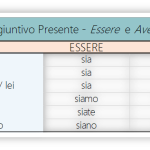Second quiz & audio on the Congiuntivo. Today we’ll talk about the Congiuntivo Presente, regular verbs
In a previous post, I wrote about the congiuntivo presente of the verbs essere and avere. It is important to learn essere and avere first. You will use them with the congiuntivo passato. Please check it out before reading this, as the general rules explained there are valid for the Congiuntivo.
Today, we will focus on the Congiuntivo Presente, regular verbs.
The ending of the infinitive is always -ARE; -ERE; -IRE. Let’s see how the endings change.
| Congiuntivo Presente | comprare | leggere | dormire | capire |
|---|---|---|---|---|
| … che io | compri | legga | dorma | capisca |
| … che tu | compri | legga | dorma | capisca |
| … che lui / lei | compri | legga | dorma | capisca |
| … che noi | compriamo | leggiamo | dormiamo | capiamo |
| … che voi | compriate | leggiate | dormiate | capiate |
| … che loro | comprino | leggano | dormano | capiscano |
A few caveats
- Verbs ending in -IRE, like CAPIRE, FINIRE etc… have longer endings
- Verbs in ere and ire (leggere, dormire) have the same endings.
- Singular pronouns (…che io, tu, lui / lei) have the same endings, so If we don’t know from the context the subject of the congiuntivo, we need to clarify who does wat.
eg: Loro pensano / che lavori di domenica.
Unless this is clear from the context, the subject of the verb lavori could be io, tu, lui /lei.
When we need to use the Congiuntivo Presente
The “rules of engagement”, valid for all tenses of the Congiuntivo, are the same I have explained in the first post. We are going to integrate here new examples and situations.
The congiuntivo is used in dependent clauses, usually introduced by che.
Some examples
- Laura vuole / che io cucini per lei.
- Noi pensiamo / che Maria lavori troppo.
- I miei genitori sperano / che voi compriate una casa più grande.
⚠️ Very important: When we have the same subject in the two clauses, we don’t need the congiuntivo but a simple infinito or indicativo. For example, the sentences above could be:
- Laura vuole cucinare.
- Noi pensiamo di lavorare troppo.
- I miei genitori sperano di comprare una casa più grande.
We mentioned that the Congiuntivo is always in a dependent clause, so the choice of one the four tenses (presente, passato, imperfetto, trapassato) depends on the main clause
Laura vuole (adesso) che io cucini (adesso o in futuro) —> presente + presente
Please note, we don’t have the congiuntivo futuro. So, if we have a clause that describes a future event, in many cases we can use the futuro indicativo or the congiuntivo presente after che.
- Spero che tu domani venga alla festa.
- Spero che (tu) domani verrai alla festa.
The first choice here is “venga”, since “spero che” goes hand in hand with the congiuntivo.
Some scenarios
VERBS & NOUNS EXPRESSING PERSONAL OPINION
VERBS: Credere, avere l’impressione, dubitare, giudicare, immaginare (immaginarsi), mettere (suppose that), negare, parere, pensare, presumere, ritenere, sembrare, sospettare, supporre…
- Mi pare che Laura non mangi carne.
- Supponiamo che tu perda il lavoro; cosa faresti?
- Immagino che i tuoi amici desiderino venire alla nostra festa.
- Il mio capo ritiene che i nostri affari non procedano bene.
NOUNS: AVERE + il dubbio, l’impressione, la sensazione, idea, il sospetto… etc.
- Ho l’impressione che Fabio non veda bene senza occhiali.
- Abbiamo la sensazione che Luigi racconti solo delle bugie.
- Mia sorella ha il dubbio che suo figlio non si senta bene.
VERBS & NOUNS OF REQUEST, PERMISSION
VERBS: Accettare, acconsentire, chiedere, decidere, disporre, domandare, esigere, evitare, impedire, lasciare, ordinare, ottenere, permettere, pregare, preoccuparsi, pretendere, proporre, raccomandare (raccomandarsi), sopportare, suggerire.
- Il sindaco ha ordinato che i negozi chiudano la domenica.
- Abbiamo proposto al capo che la pausa pranzo duri di più.
- Ho chiesto al padrone di casa che i muri siano ridipinti.
- Non pretendete mica che vi paghi la cena!
NOUNS: Bisogno, condizione, desiderio, intenzione, ordine, regola, scopo … etc
- Non c’è bisogno che tu me lo dica, lo so già.
- Il Papa ha espresso il desiderio che la guerra finisca.
- Andrò al cinema con Federica, a condizione che ci accompagni anche tu.
VERBS & NOUNS EXPRESSING FEELINGS & EXPECTATIONS
VERBS: Aspettare (aspettarsi), attendere (attendersi), augurare (augurarsi), desiderare, dispiacere (dispiacersi), fingere, illudersi, preferire, sperare, temere, volere.
- Lorena si aspetta che Stefano le chieda scusa.
- Mi aspetto che tu legga attentamente il contratto.
- Spero che l’esame finisca presto.
- Preferisco che stasera restiamo a casa.
NOUNS: Attesa, desiderio, paura, pericolo, speranza, timore, sensazione etc…
- Non c’è pericolo che tu sia licenziato.
- Ho paura che Laura abbia il morbillo.
SOME IMPERSONAL VERBS
VERBS: bastare, bisognare, convenire, dispiacere, importare, occorrere, servire …etc
- Bisogna che tu pratichi un po’ di sport.
- Non importa che il gatto sia bianco o nero. Basta che prenda il topo.
- Occorre che suo figlio studi di più o sarà bocciato.
- Conviene a te e alla tua famiglia che tu smetta di fumare.
- Dispiace che le vacanze finiscano dopo ferragosto.
ESSERE + ADJECTIVES
è normale, è ovvio, è importante, è inutile, è meglio, è logico, è necessario, è indispensabile …etc
- È normale che tu sia arrabbiato.
- È inutile che i tuoi amici si lamentino.
- È necessario che puliate la vostra camera.
- È meglio che riposino dopo un lungo viaggio.
Now, solve the quiz and check your final score. Alla prossima!
LOADING QUIZ…



